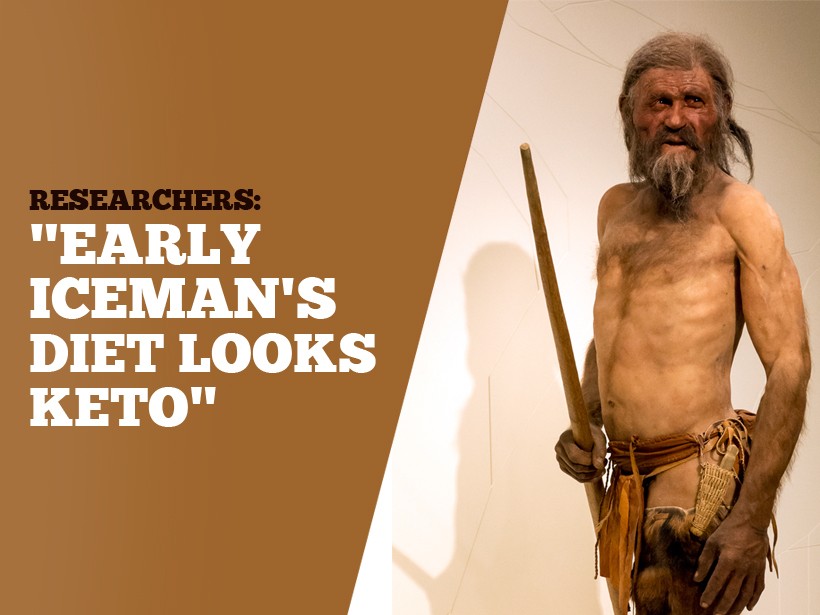The tragic tale of Otzi, the 5,300-year-old iceman who was murdered in the Alps from an arrow wound and head injury, has fascinated researchers since the late 1990’s. The ongoing examination and dissection of Otzi’s glacier-preserved body has provided academics with a ton of insight on early human life. Now, in a new analysis of the ancient iceman’s body, researchers have made another interesting discovery—Otzi’s stomach contents at the time of his death suggest that the humanoid consumed a diet strikingly similar to today’s ketogenic diet.
A keto feast?
Before Otzi was murdered, researchers confirmed that he had one heck of a last meal. Microbiologist Frank Maixner of the Eurac Research Institute for Mummy Studies found that Otzi’s stomach contents were composed of about “50% fat,” with the iceman also enjoying wild goat and red deer meat as well.1 Further analysis of stomach contents indicated that the meat and fat Otzi consumed was smoked, cooked, or dried before consumption—so it’s safe to say that the iceman enjoyed a meal jam-packed with filling fats and energy-giving protein before his tragic end.
An “excellent energy source”
It’s no surprise that Otzi consumed a diet high in fat and protein—after all, when you’re living in the freezing cold Alps, filling food is at a premium. According to researcher Albert Zink, Otzi “seemed to have been fully aware that fat represents an excellent energy source.” Animal and plant fats, like those now recommended with the ketogenic diet, are well-known for their filling effects—and in an icy environment, they likely helped to keep Otzi alive.
“The high and cold environment is particularly challenging for the human physiology and requires optimal nutrient supply to avoid rapid starvation and energy loss.”1
Ancient nutrition
Otzi’s diet looked a lot like today’s ketogenic diet because it focused on consuming naturally-occurring plants, fats, and proteins—Otzi couldn’t exactly walk into a grocery store and pick up a loaf of bread. Today, the majority of our foods are saturated with processed carbohydrates and excess sugar, a stark contrast to the natural diet that researchers believe Otzi consumed. Surprisingly, researchers have found that the iceman’s diet was well-balanced without taking a multi-vitamin. “The Iceman’s last meal was a well-balanced mix of carbohydrates, proteins, and lipids, perfectly adjusted to the energetic requirements of his high-altitude trekking,” says a new paper on the ancient nutrition.1
Only time will tell what other secrets Otzi’s body will reveal about early human nutrition, but for now, one thing seems clear—a high-fat diet was necessary to survive the harsh climates of our ancestors! Could the ketogenic diet (though Otzi probably wouldn’t have called it that) have been accidentally discovered before the humans we know today existed? Otzi and his tribe might have said yes!
NUTRITIONAL DISCLAIMER
The content on this website should not be taken as medical advice and you should ALWAYS consult with your doctor before starting any diet or exercise program. We provide nutritional data for our recipes as a courtesy to our readers. We use Total Keto Diet app software to calculate the nutrition and we remove fiber and sugar alcohols, like erythritol, from the total carbohydrate count to get to the net carb count, as they do not affect your blood glucose levels. You should independently calculate nutritional information on your own and not rely on our data. The website or content herein is not intended to cure, prevent, diagnose or treat any disease. This website shall not be liable for adverse reactions or any other outcome resulting from the use of recipes or recommendations on the Website or actions you take as a result. Any action you take is strictly at your own risk.
- This Grocery Store Team Lost Over 200 Pounds Using Keto - December 19, 2018
- Treating Diabetes with Weight Loss - December 12, 2018
- Ancient Nutrition Connects With Natural Partners - December 5, 2018




